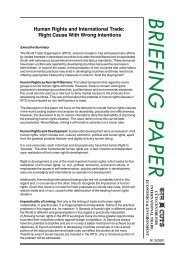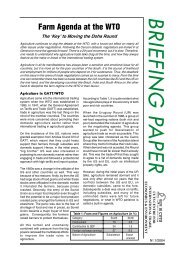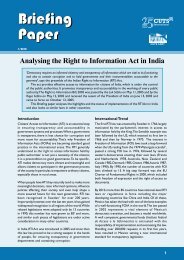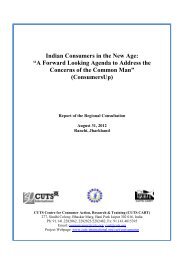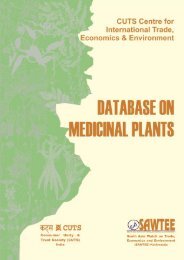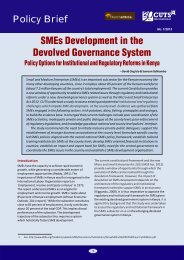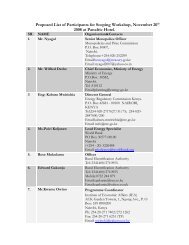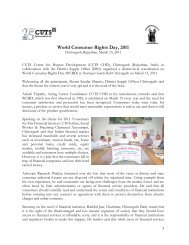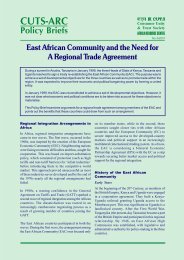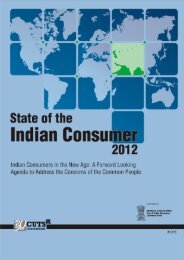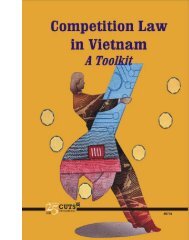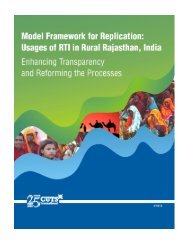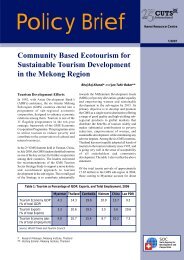Final Report - World Trade Organization
Final Report - World Trade Organization
Final Report - World Trade Organization
You also want an ePaper? Increase the reach of your titles
YUMPU automatically turns print PDFs into web optimized ePapers that Google loves.
It can well be expected that when the CA is not<br />
even legally autonomous, there will be interference<br />
from the Government, which has been proved both<br />
in Kenya and Tanzania. In Kenya of course the<br />
Minister was right in overruling CA’s decision in the<br />
Coca Cola case. However, this cannot be generalised<br />
as it is not known if the Minister took the right and<br />
impartial decision in all the cases that have been<br />
overruled. It may, however, be noted that in Kenya<br />
the Minister is well within his lawful right to overrule<br />
any decision of the CA.<br />
In Tanzania, the arrangement is quite different. Here<br />
even though the CA functions under the Ministry, its<br />
decisions are binding except in M&A cases. In the<br />
Kibo Breweries v. Tanzania Breweries Limited<br />
case, the CA’s decision was binding and neither the<br />
Minister nor any other senior officer in the Ministry<br />
was required to play any role. However, the<br />
Permanent Secretary of the Ministry of Industry and<br />
<strong>Trade</strong> who was a member of the TBL’s board<br />
supported the company in contravening the order of<br />
the CA. 208 This is a blatant violation of the law of<br />
the land.<br />
The CA being de jure autonomous of course does<br />
not necessarily mean that it will enjoy de facto<br />
autonomy. This was evident in Pakistan where the<br />
Government interfered in a number of cases, the<br />
cement cartel case being the most notable one. The<br />
competition authority tried to curb cartelisation and<br />
collusive pricing by the manufacturers but the<br />
government intervened to fix prices at a ‘mutually<br />
acceptable’ level. 209<br />
No such undue intervention by the Government was<br />
reported in other 7-Up countries. In Sri Lanka, it is<br />
believed that government interference is there, but it<br />
was not apparent in so far as handling of the cases<br />
are concerned. In case of India and Sri Lanka it may<br />
be quite possible that by remaining relatively inactive,<br />
especially in controversial and difficult cases, the CAs<br />
ensured that the vested interests did not feel any need<br />
to interfere in their affairs.<br />
There might be other kinds of external influence on<br />
the CAs as well. Public opinion is one such factor.<br />
Sometimes competition authorities get swayed by<br />
public opinion/emotions or national sentiments and<br />
take decisions, which may not be the best or required<br />
to promote competition. The takeover of East Kenya<br />
Bottlers Co. Ltd by Coca Cola in Kenya became a<br />
national issue there. Even though it did not raise any<br />
major competition issue as such the CA decided to<br />
block it, partly because it was highly influenced by<br />
the public opinion. Secondly, because it violated an<br />
undertaking by Coca Cola to not to take over any<br />
further bottling plants in the country.<br />
Similarly in Zambia, the Chilanga Cement case<br />
became a national issue and ZCC, even though was<br />
initially swayed by the public mood, finally allowed<br />
the takeover with some conditions, which was<br />
probably the best option before it. However, still many<br />
people in Zambia feel that ZCC should not have<br />
allowed the takeover.<br />
Public perception on competition may not be<br />
necessarily correct. CAs need to take decisions<br />
based on merits (of promoting and maintaining<br />
competition) and not popular perceptions. Sometimes<br />
CAs devote much of regulatory resource in a case<br />
that may not be important from competition viewpoint<br />
but on public mood, which may have been whipped<br />
up by the media, which in turn could have been<br />
orchestrated by some interested party. But<br />
conserving regulatory resource, which is scarce is<br />
very important. Prioritising the cases on merits may<br />
help in this regard.<br />
Lobbying by different interest groups can also make<br />
a difference in many jurisdictions. In India, for<br />
example, the MRTPC was found to be quite active<br />
in one case but exhibiting complete silence in the<br />
other case. This may raise doubts if the MRTPC<br />
indeed acts on its own. In the soda ash case, the<br />
domestic soda ash lobby: AMAI lobbied for the case,<br />
which was backed by few big industrial houses of<br />
the country. In the cement cases the sufferers are<br />
ordinary consumers. Even the appellant, the Builders<br />
Association of India is an association of small builders<br />
who do not wield much power.<br />
It was also generally observed that businesses are<br />
more active in lobbying and consumer movement is<br />
weak in most countries. It is quite possible that the<br />
competition authorities might find it difficult to<br />
maintain a balance between business and consumer<br />
interests in a situation where there is lot of business<br />
lobbying but no countervailing influence. India is an<br />
208 See CUTS, 2002, Competition Law & Policy - A Tool for Development in Tanzania, table 6.<br />
209 CUTS, 2002, Competition Regime in Pakistan - Waiting for a Shake-Up, section 4.2.6.<br />
Pulling Up Our Socks w 69



